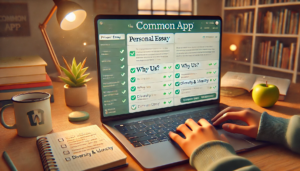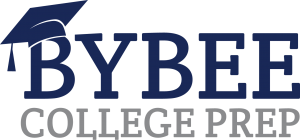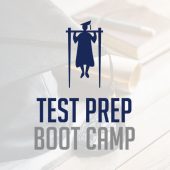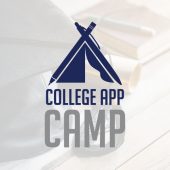The Ultimate Junior Year Checklist: How to Get Your College Applications Ready
Your Step-by-Step Guide to College Application Preparation for Juniors
The end of the Junior year will be here before you know it, and if you want to start Senior year stress-free, now is the time to get your college applications in order. By August 1, when most applications open, you should have your materials ready to go. This guide will walk you through everything you need to do between now and then to ensure you’re fully prepared.
1. Choose Your Major Wisely
One of the biggest mistakes high school students make is picking a broad major without understanding its nuances. “Business” and “Engineering” are two of the most popular choices, yet both fields include a variety of specializations.
For example:
- Engineering could mean Mechanical, Civil, Aerospace, Electrical, or Computer Engineering—each with different coursework and career paths.
- Business could lead to Finance, Marketing, Entrepreneurship, or International Business—each requiring different skill sets.
Ask yourself: Why am I choosing this major? If you’re unsure, a resource like YouScience can provide career insights based on your strengths and interests.
2. Build a College List and Research Schools
A well-rounded college list includes 7-10 schools across reach, match, and safety categories. Here’s what to research:
✔ Middle 50% SAT/ACT scores – This range represents the scores of the middle half of admitted students.
✔ Test-optional policies – If a school is test-optional, determine whether you can still qualify for merit scholarships without a test score.
✔ Acceptance rates & GPA expectations – A school’s Common Data Set (CDS) provides insights into the GPA, test scores, and class rank of admitted students.
Pro Tip: Find a school’s Common Data Set (CDS) by Googling “[School Name] Common Data Set.” This document is a goldmine for applicants!
Use College Navigator to begin your research.
3. Set Your Target Test Score
Once you know a school’s median SAT/ACT score, you have a benchmark. However, remember:
📌 GPA matters more. Colleges look at GPA and class rank before considering test scores.
📌 A high test score won’t compensate for a weak GPA. If your grades aren’t strong, no test score can override that.
4. Plan for Additional Testing
If you need to retake the SAT/ACT, identify which test dates work best.
💡 May SAT often conflicts with AP exams, making June or August a better option.
If you need significant score improvements, consider structured prep like our Test Prep Boot Camp, where students typically increase:
📈 SAT by 180-200 points
📈 ACT by 4-5 points
For larger improvements, one-on-one tutoring plus multiple test attempts may be necessary.
 5. Ask for Letters of Recommendation
5. Ask for Letters of Recommendation
By the end of Junior year, decide who will write your letters of recommendation. You typically need:
- One core subject teacher (preferably from Junior year).
- One additional recommender (Sophomore teacher, coach, employer, etc.).
Best Time to Ask: After AP exams but before Finals. Keep it simple:
“I’m preparing my college applications and would love for you to write a letter of recommendation. Would you be willing?”
If they agree, ask about their process and preferred submission method.
6. Set Up Your Common App Account
You don’t have to wait until August—create your Common App account now and start filling out your profile.
Why Common App?
✅ Used by over 1,000 universities
✅ Allows you to apply to up to 20 schools
✅ Preferred by many universities for its streamlined process
Pro Tip: Look for green check marks. These indicate completed sections, helping you track progress.

7. Write Your Common App Essay
The Common App Personal Statement is a 650-word essay required by most schools. The prompts are available well before August 1.
Essay Strategy:
✏ Write 800-900 words and then edit down. It’s easier to trim than add.
✏ Stay above 90% of the word limit to maximize storytelling depth.
✏ Start now. Your first draft should be ready before Senior year.
Need help? Our College App Camp guides students through resume writing, recommendation letters, Common App completion, and essay writing—all in just 12 hours over 4 days.
Pro Tip: Common App resets in late July. Essays will be erased, but demographic info stays. Write and save essays in a separate file.
8. Prepare for Supplemental Essays
Some schools require extra essays beyond the main Common App essay. These often include:
📝 Why Us? – Why do you want to attend this school? (Usually 150-250 words)
📝 Diversity & Identity – How has your background shaped you?
📝 Your Future Goals – What do you hope to achieve?
More selective schools will have multiple supplements, so check early and plan accordingly.
9. Stay Organized with a Spreadsheet
To keep everything in order, create a college application spreadsheet with:
✅ School Name
✅ Application Deadline (Early Action, Early Decision, Regular Decision)
✅ Application Platform (Common App, Coalition, school-specific)
✅ Test Score Requirements
✅ Recommendation Letter Needs
✅ Essay Requirements (Color-code: 🔴 Not Started, 🟡 In Progress, 🟢 Complete)
A well-maintained spreadsheet keeps you on track and reduces last-minute stress.
Final Thoughts: Set Yourself Up for a Stress-Free Senior Year
By following these steps, you’ll enter Senior year ready to submit your applications as soon as they open—with no scrambling, no last-minute panic, and a clear path forward.
🚀 Want expert guidance? Schedule a free consultation with us to discuss your goals and application strategy!
Your future starts now—let’s make it happen. ✅










